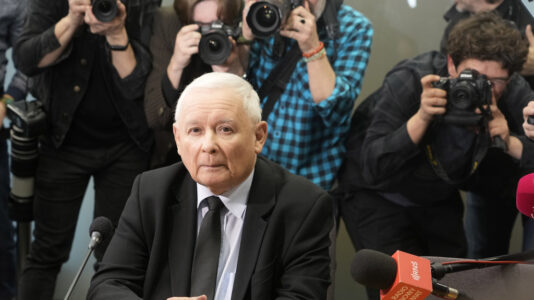A former NBP chief and mayor of Warsaw has come out with some sharp criticism of Poland’s recent gold purchases, and social media users were not having it, Zbigniew Kuźmiuk writes in wPolityce.
Kuźmiuk reported on National Bank of Poland President Adam Glapiński’s press conference last week, quoting him on X as saying that Poland now has more than $200 billion in foreign exchange reserves, including 420 tons of gold, that the country’s gold reserves have increased from about 100 tons in 2015 to the current 420 tons, and that the NBP management board will strive to ensure that gold reserves ultimately constitute 20 percent of foreign exchange reserves.
NBP’s current gold reserves rank it 12th in the world, overtaking the U.K., Saudi Arabia, Uzbekistan, and Portugal.
Hanna Gronkiewicz-Waltz, until recently the deputy chairwoman of Prime Minister Donald Tusk’s Civic Platform, reposted his entry on X with the comment: “And if we are buying gold, it means that someone is selling, why are they doing so? There are a few other questions, e.g., in the event of a crisis, what is easier to sell: currency or gold?”
Her post had over 210,000 views at the time of writing, and close to 1,000 replies, with many commentators surprised that someone who served as the head of NBP would not have a better understanding of economics.
Some of the comments were scathing. “This is a fake account, right? A UW professor needs to think at least a little,” said one, while another replied: “She doesn’t have to. ‘Why do I need a brain when I’m part of the elite?”
“Why do we need gold, tenement houses sell better,” one poster seemed to joke. Another comment read: “Did you, idiot, just criticize gold purchases? At a time when all the central banks are accumulating it en masse and it is becoming more and more valuable?”
Some, however, pointed out that there are liquidity issues with gold, which can be an issue if/when cash is needed.
Gronkiewicz-Waltz served as mayor of Warsaw from 2006 to 2018 and prior to that was head of the National Bank of Poland from 1992 to 2000. She has been a member of Donald Tusk’s Civic Platform (PO) since 2005, was until recently its deputy chairwoman, and is expected to take over as MEP for Marcin Kierwiński, who Tusk has appointed to be the government’s representative for post-flood reconstruction.
Her attack on Glapiński should not come as a surprise, as Tusk has been trying to oust him as head of the central bank since he took office.
Earlier this year, Remix News reported on Tusk’s government having prepared an indictment against Glapiński, including for the purchase of state bonds that led to the indirect financing of the state budget deficit by the central bank, weakening Poland’s currency (PLN or zloty), failure to control inflation, and alleged violation of the apolitical nature of the office of the NBP head.
In December last year, head of the European Central Bank (ECB) Lagarde assured Glapiński that he would be protected by EU law, while just this past August Poland’s own top constitutional court ruled that a trial would be illegal. Still, some say Tusk will not be letting the issue go so easily.
Last week, Glapiński also stressed that with a war directly to Poland’s east, having a large amount of gold in the country’s currency reserves strengthens Poland’s economic credibility and helps stabilize the Polish economy. The central bank head had additionally announced in September that there would be no interest rate cuts for the rest of the year, although cuts may resume in Q2 2025, depending on inflationary pressures.
Glapiński has an impressive track record
Poland’s reserve assets managed by the central bank amounted to €192.5 billion at the end of August 2024, or $213.1 billion, up from €86.9 billion or $94.9 billion in 2015, thus doubling in value, with the value of reserves in gold increasing more than fourfold. When Glapiński took over as president of NBP in 2016, the gold resources in NBP’s currency reserves fluctuated around 100 tons and were successively increased: In 2018, 26 tons were purchased, in 2019 another 100 tons, and after Russia’s aggression against Ukraine in 2023, as many as 130 tons, and by September 2024, another 61 tons.
In its press release, NBP emphasized that it manages foreign exchange reserves, taking care to maximize their profitability, but the priority is their safety and maintaining the necessary level of liquidity. The main part of reserves is invested in government securities (approximately 70 percent), in securities issued by international institutions and government agencies, while the remaining part is held in the form of deposits in high-reliability banks and in gold.
So what is Tusk’s beef with Glapiński?
Information about the size and structure of Polish currency reserves, as well as the rapid increase in their value over the last eight years, explains why for several years there has been enormous pressure from large EU countries, including Germany in particular, for Poland to join the eurozone, writes Kuźmiuk.
As he explains, Poland entering the eurozone would have a very beneficial psychological effect because it would be a large country entering the eurozone, countering rumors about its demise. It would also serve to strengthen the euro since the fifth or sixth fast-growing economy of the EU would be joining the zone, as well as a country with huge foreign exchange reserves, the value of which now exceed $200 billion, including some 15 percent in gold.
But Glapiński is staunchly against switching to the euro, as it would mean a significant impoverishment of a large part of Polish society and a weakening of its development opportunities.
“That is precisely why the current parliamentary majority is constantly attacking Glapiński,” Kuźmiuk says, and why former NBP head Hanna Gronkiewicz-Waltz makes such posts questioning his gold purchases on X.
That is also why Glapiński is facing a possible trial in front of the State Tribunal — to get him out of the way. This is, of course, ironic, as he seems to be the guy who has steered Poland to being such an attractive acquisition for the eurozone in the first place.






